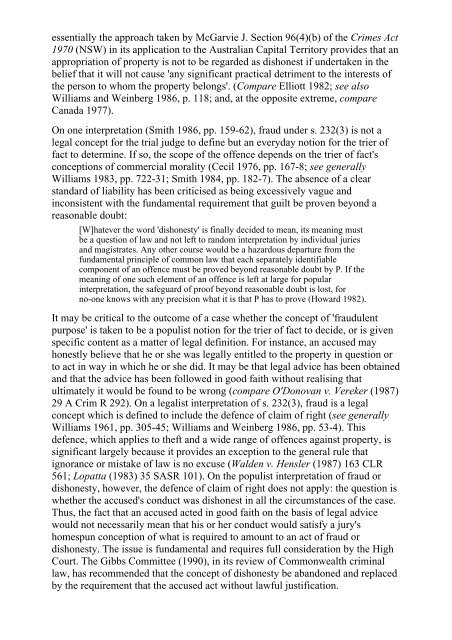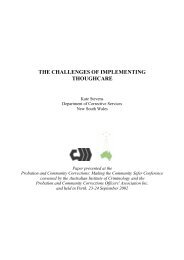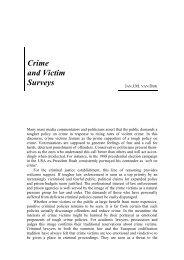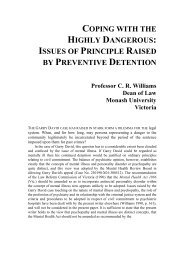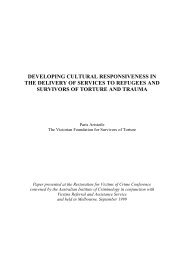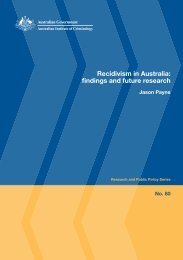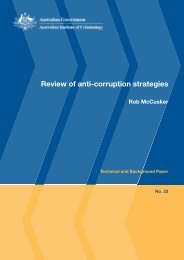Fraud and the liability of company directors - Australian Institute of ...
Fraud and the liability of company directors - Australian Institute of ...
Fraud and the liability of company directors - Australian Institute of ...
Create successful ePaper yourself
Turn your PDF publications into a flip-book with our unique Google optimized e-Paper software.
essentially <strong>the</strong> approach taken by McGarvie J. Section 96(4)(b) <strong>of</strong> <strong>the</strong> Crimes Act<br />
1970 (NSW) in its application to <strong>the</strong> <strong>Australian</strong> Capital Territory provides that an<br />
appropriation <strong>of</strong> property is not to be regarded as dishonest if undertaken in <strong>the</strong><br />
belief that it will not cause 'any significant practical detriment to <strong>the</strong> interests <strong>of</strong><br />
<strong>the</strong> person to whom <strong>the</strong> property belongs'. (Compare Elliott 1982; see also<br />
Williams <strong>and</strong> Weinberg 1986, p. 118; <strong>and</strong>, at <strong>the</strong> opposite extreme, compare<br />
Canada 1977).<br />
On one interpretation (Smith 1986, pp. 159-62), fraud under s. 232(3) is not a<br />
legal concept for <strong>the</strong> trial judge to define but an everyday notion for <strong>the</strong> trier <strong>of</strong><br />
fact to determine. If so, <strong>the</strong> scope <strong>of</strong> <strong>the</strong> <strong>of</strong>fence depends on <strong>the</strong> trier <strong>of</strong> fact's<br />
conceptions <strong>of</strong> commercial morality (Cecil 1976, pp. 167-8; see generally<br />
Williams 1983, pp. 722-31; Smith 1984, pp. 182-7). The absence <strong>of</strong> a clear<br />
st<strong>and</strong>ard <strong>of</strong> <strong>liability</strong> has been criticised as being excessively vague <strong>and</strong><br />
inconsistent with <strong>the</strong> fundamental requirement that guilt be proven beyond a<br />
reasonable doubt:<br />
[W]hatever <strong>the</strong> word 'dishonesty' is finally decided to mean, its meaning must<br />
be a question <strong>of</strong> law <strong>and</strong> not left to r<strong>and</strong>om interpretation by individual juries<br />
<strong>and</strong> magistrates. Any o<strong>the</strong>r course would be a hazardous departure from <strong>the</strong><br />
fundamental principle <strong>of</strong> common law that each separately identifiable<br />
component <strong>of</strong> an <strong>of</strong>fence must be proved beyond reasonable doubt by P. If <strong>the</strong><br />
meaning <strong>of</strong> one such element <strong>of</strong> an <strong>of</strong>fence is left at large for popular<br />
interpretation, <strong>the</strong> safeguard <strong>of</strong> pro<strong>of</strong> beyond reasonable doubt is lost, for<br />
no-one knows with any precision what it is that P has to prove (Howard 1982).<br />
It may be critical to <strong>the</strong> outcome <strong>of</strong> a case whe<strong>the</strong>r <strong>the</strong> concept <strong>of</strong> 'fraudulent<br />
purpose' is taken to be a populist notion for <strong>the</strong> trier <strong>of</strong> fact to decide, or is given<br />
specific content as a matter <strong>of</strong> legal definition. For instance, an accused may<br />
honestly believe that he or she was legally entitled to <strong>the</strong> property in question or<br />
to act in way in which he or she did. It may be that legal advice has been obtained<br />
<strong>and</strong> that <strong>the</strong> advice has been followed in good faith without realising that<br />
ultimately it would be found to be wrong (compare O'Donovan v. Vereker (1987)<br />
29 A Crim R 292). On a legalist interpretation <strong>of</strong> s. 232(3), fraud is a legal<br />
concept which is defined to include <strong>the</strong> defence <strong>of</strong> claim <strong>of</strong> right (see generally<br />
Williams 1961, pp. 305-45; Williams <strong>and</strong> Weinberg 1986, pp. 53-4). This<br />
defence, which applies to <strong>the</strong>ft <strong>and</strong> a wide range <strong>of</strong> <strong>of</strong>fences against property, is<br />
significant largely because it provides an exception to <strong>the</strong> general rule that<br />
ignorance or mistake <strong>of</strong> law is no excuse (Walden v. Hensler (1987) 163 CLR<br />
561; Lopatta (1983) 35 SASR 101). On <strong>the</strong> populist interpretation <strong>of</strong> fraud or<br />
dishonesty, however, <strong>the</strong> defence <strong>of</strong> claim <strong>of</strong> right does not apply: <strong>the</strong> question is<br />
whe<strong>the</strong>r <strong>the</strong> accused's conduct was dishonest in all <strong>the</strong> circumstances <strong>of</strong> <strong>the</strong> case.<br />
Thus, <strong>the</strong> fact that an accused acted in good faith on <strong>the</strong> basis <strong>of</strong> legal advice<br />
would not necessarily mean that his or her conduct would satisfy a jury's<br />
homespun conception <strong>of</strong> what is required to amount to an act <strong>of</strong> fraud or<br />
dishonesty. The issue is fundamental <strong>and</strong> requires full consideration by <strong>the</strong> High<br />
Court. The Gibbs Committee (1990), in its review <strong>of</strong> Commonwealth criminal<br />
law, has recommended that <strong>the</strong> concept <strong>of</strong> dishonesty be ab<strong>and</strong>oned <strong>and</strong> replaced<br />
by <strong>the</strong> requirement that <strong>the</strong> accused act without lawful justification.


